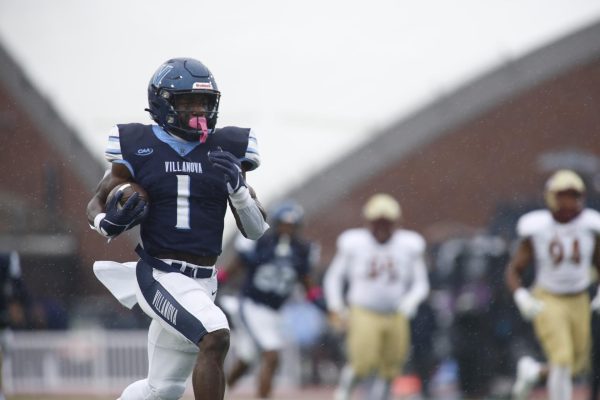Recognizing women’s history
March 31, 2005
International Women’s Day, celebrated for the first time on March 8, 1911 in Europe, began as a one-day commemoration that was extended to a week-long celebration in Sonoma County, California. The public celebration of women’s history in America was further elongated in 1981 when Congress expanded the celebration to the entire month of March.
However, the fight for women’s rights began long before then. With the first Women’s Rights Convention held in Seneca Falls, N.Y. in 1848, the women’s suffrage movement truly gathered steam. The 19th Amendment to the Constitution, granting women suffrage, was finally ratified on August 26, 1920.
There are many contenders for a list of the most influential women in history. The following women have all proven themselves to be extraordinary in their respective fields and have made significant contributions to society.
Madonna Louise Ciccone,
Singer/Actress
Born August 16, 1958
Grammy award-winning international superstar Madonna, one of the select few who has the honor of being known by only one name, earned her status as a result of her self-promotion and dedication in the music and acting fields. When she was only five years old her mother died of breast cancer.
A rebellious child, Madonna constantly broke the rules and wanted to do everything she was told she shouldn’t or couldn’t. With only 35 dollars in her pocket, this Michigan born girl found herself alone in New York City in search of a career that only she and her dance teacher believed in. The rest is history. Madonna has broken almost every radio, video, and box-office record with 29 top 10 singles. With a childhood wish to rule the world, Madonna has come closer to that goal than anyone could have imagined.
She said: “Poor is the man whose pleasures depend on the permission of another.”
Betty Naomi Goldstein Friedan, Activist/Author
Born February 4, 1921
A feminist and women’s rights activist of the 1960s, Betty Friedan is perhaps one of the most influential women in the fight for equality between the sexes. Author of “The Feminine Mystique,” Friedan found herself as well as other women being handicapped by their sex.
Her book, published in 1963, was a catalyst for the women’s liberation movement, arguing that women’s unhappiness was a product of a society that did not allow women to fulfill their needs and potentials. Friedan also co-founded the U.S. National Organization for Women and served as its first president.
She said: “A woman is handicapped by her sex, and handicaps society, either by slavishly copying the pattern of man’s advance in the professions, or by refusing to compete with man at all.”
Jane Goodall, Primatologist
Born April 3, 1934
Most people picture Jane Goodall dressed in khaki, deep in the jungles of Africa with a chimpanzee perched on her hip.
This London – born primatologist has devoted years of research and observation to shrink the gap between chimpanzees and humans. Over the many years of her studies, her discoveries have been regarded as landmarks in primatology and ethology. Her patient observations transformed how we perceive chimpanzees as a species and also how studies of other kinds of animals are carried out.
She said: “If you really want something, and really work hard, and take advantage of opportunities, and never give up, you will find a way.”
Sandra Day O’Connor, Supreme Court Justice
Born March 26, 1930
Nominated in 1981 by President Ronald Reagan, O’Connor was sworn in as the United States Supreme Court’s 102nd justice and its first female member. Educated at Stanford University, her opinions are mostly conservative, and she is a frequent swing vote. She has voted upon many watershed cases that have determined the path of America in issues such as affirmative action, sentencing for federal offenders and homosexual relationships. She said: “The power I exert on the court depends on the power of my arguments, not on my gender.”
Sally Ride, Astronaut
Born May 26, 1951
Astronaut and astrophysicist, Ride was selected out of 1,000 other female candidates for NASA’s astronaut program in 1978. In 1983 she became the first American woman in space aboard the space shuttle Challenger.
After establishing herself in the history books, she was part of another flight on the Challenger, an eight-day mission in 1984 as a mission specialist. This was the largest crew to fly to date. Ride was also a member of the Presidential Commission on the Space Shuttle Challenger Accident of 1986. Ride broke the traditional boundary against women entering space.
She said: “All adventures, especially into new territory, are scary.””
Barbara Walters, Journalist
Born September 25, 1931
With a curious mind and a drive for answers, Walters has interviewed foreign dignitaries from Fidel Castro to Princess Diana as well as current American icons from Judy Garland to Paris Hilton.
Walters earned the title of the first woman co-anchor of a network evening newscast and, at the time, received the highest pay in the history of television broadcasting. Her abilities and experience in research, writing, filming, and editing earned her a job as news and public affairs producer for CBS.
She said: “A woman can do anything. She can be traditionally feminine and that’s all right; she can work, she can stay at home; she can be aggressive; she can be passive; she can be any way she wants with a man. But whenever there are the kinds of choices there are today, unless you have some solid base, life can be frightening.”










